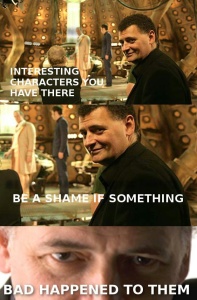 Yes, I promised I’d post two blogs Thursday. I didn’t get around to the second. I felt bad. Then I realized Monday was Leap Day. I couldn’t miss a chance to post something on a day that only comes once every four years. So, here’s the bonus blog. 😛
Yes, I promised I’d post two blogs Thursday. I didn’t get around to the second. I felt bad. Then I realized Monday was Leap Day. I couldn’t miss a chance to post something on a day that only comes once every four years. So, here’s the bonus blog. 😛
Anyway…
I’m a dreamer living in a world that seems hostile toward such people. I’m not the only one, though. I’ve heard many stories about artists (though dreamers can also be scientists and missionaries, etc.) in particular who grew up in blue collar families/communities and were discouraged from pursuing their passions. “Get a real job!” they’d be told. They didn’t understand the dreamers’ aspirations, their desire to do extraordinary things. No, these naysayers knew only of clocking in and out at their easily understood and quantifiable jobs and bringing home a paycheck.
I don’t say this to demean blue collar (or white collar) types. In fact, I admire their work ethic and down-to-earth attitudes. Many, if not most, are full of common sense and free of the delusions that pervade certain demographics of society.
However, oftentimes they are so down-to-earth, they can’t understand people who, for lack of a better term, has their heads in the clouds. Actors, writers, and directors, to name a few, often came from families like this who, at best, tolerated their kids’ unusual interests or, at worst, tried to force them into the “normal” mold. This was usually done with good intentions—wanting to make sure their kids could provide for themselves—but it came at the expense of crushing their children’s souls. It was a forced denial of who they were. It made the dreamers live while dying inside.
I know this from experience. My father has a blue collar mentality. When I said I wanted to go to college to study writing, he was supportive. He even helped pay for it. But then a couple years ago, he revealed to me that when I made that decision, he thought I was crazy. He didn’t think I could make it as a writer. I was flabbergasted, disappointed, angry. This was the man who, just a few years before, read my first novel, Pandora’s Box, and liked it; who read my newspaper articles and thought I was an ideal journalist because I didn’t put any biased spin in them. It was, to say the least, a bit of a blow, especially since I was (and am) a struggling artist.
My theory is people like this don’t understand dreamers for two reasons: 1) The dreamer’s path to success is more abstract, less direct, and less certain, and 2) the dreamer’s aspirations and goals are too “pie-in-the-sky.” Going to a factory or office and putting in one’s eight-hour shift is simple and direct. The most such workers have to think about is perhaps moving up in the company and/or getting a raise. Dreamers have to take risks and think outside the box. Someone who aspires to start a nonprofit to, say, help inner city kids has to do fundraisers. Writers have to submit stories to publishers and agents. Actors have to attend auditions. In all these cases, there’s no guarantee of success, and initial success doesn’t always guarantee ongoing success. They don’t get paid a salary or an hourly wage. The closest equivalent are independent contractors. It’s also usually a slow, gradual process to becoming “successful” for the dreamer. This is why most, including myself, hold down “day jobs” until they reach a point where they earn a living doing their “unorthodox” dream jobs. These aren’t usually the most glamorous or high-paying of day jobs, which doesn’t reflect well on the dreamers. (I’ve heard many stories of now-famous actors who worked at restaurants until they became successful).
Dreamers walk difficult roads, but if they stick it out, the results not only include a satisfying career for them, but changed lives for many others. Nonprofit organizations save lives. Writers and artists entertain and, most importantly, enlighten audiences with their art (if done right). Actors can do the same. The notoriety they gain through these can give them platforms from which they can do other great works.
This is why I’m a dreamer. This is why I support dreamers.
If you’re a dreamer, don’t give up!
If you know dreamers, I hope you will encourage them.
Are you a dreamer? If so, what are your “lofty” aspirations?

